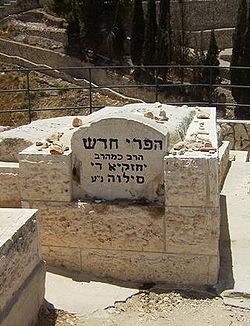- Hezekiah da Silva
-
Hezekiah da Silva (also Hezekiah Silva) (1659–1698) (Hebrew: חזקיה בן דוד די סילוא) was a Jewish author born at Livorno, Italy, son-in-law of the dayan Mordecai Befael Malachi. About 1679 he left his native city for Jerusalem, Palestine, where he attended the yeshibah of Moses Galante, and ten years later he was sent to Europe to collect funds for Jerusalem. In 1691 he was in Amsterdam and began the printing of his work Peri Hadash (פרי חדש), a commentary on the Yoreh De'ah. He remained in that city for a year. Five years later he was again at Jerusalem, his movements in the interim being unknown. He took a decided interest in the controversy of Moses Hagiz against Judah Vega, but his death in Jerusalem in 1698 cut short his activity in behalf of the former.
The freedom with which Silva discussed halakic problems brought the ban of the rabbis of Cairo upon his Peri Ḥadash, but it was afterward removed by Abraham Levi, although the two men, spiritually akin, were personally unacquainted. This work of Silva's was supplemented by a second and a third part, both edited by his son David, and bearing the approbation of the chief authorities of the time (Amsterdam, 1706–1730). Silva was likewise the author of the Mayim Ḥayyim, containing a collection of notes on Talmudic treatises, together with responsa and a portion of the Yad of Maimonides.
Silva expressly states that he was a teacher at Jerusalem, not a rabbi, but despite this statement Luncz claims that he was chief rabbi of Jerusalem and that he died in 1740.
Jewish Encyclopedia bibliography
- Azulai, Chaim Joseph, Shem ha-Gedolim
- Grätz, Heinrich, Geschichte der Juden, x. 320
- Luncz, Abraham Moses, Yerushalayim,, i.120
- Fürst, Julius, Bibliotheca Judaica, iii. 323-324
- Steinschneider, Moritz, Catalogus Librorum Hebræorum in Bibliotheca Bodleiana, col. 845
This article incorporates text from the 1901–1906 Jewish Encyclopedia article "Silva, Hezekiah" by Executive Committee of the Editorial Board and Lazarus Grünhut, a publication now in the public domain.
Categories:- 1659 births
- 1698 deaths
- People from Livorno
- Early Acharonim
- Italian Jews
- 17th-century rabbis
- Rabbis in Ottoman and British Palestine
- Burials at the Mount of Olives (Jewish)
Wikimedia Foundation. 2010.

